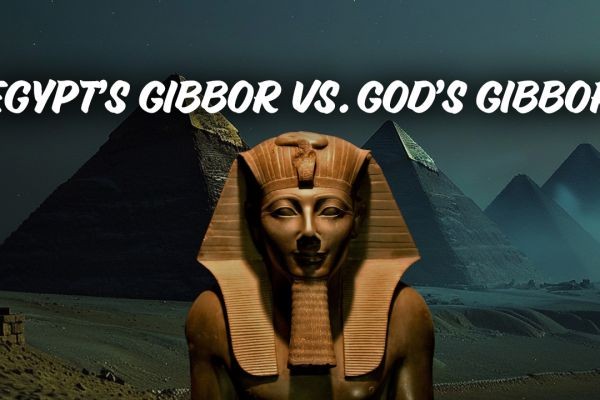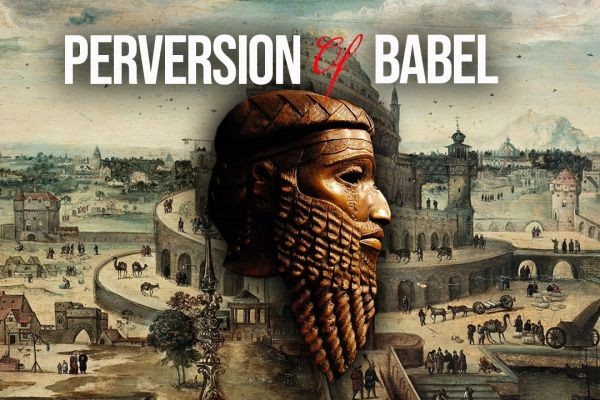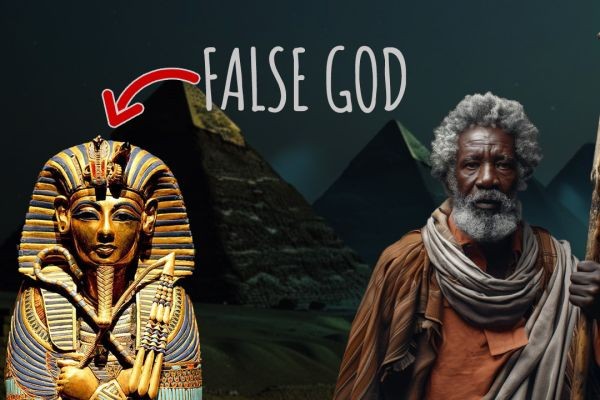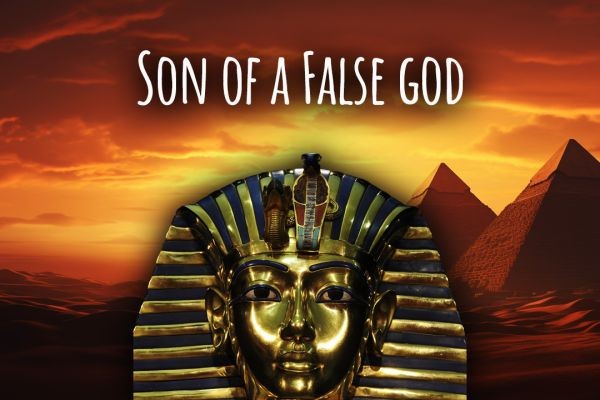In the image of this article, I want to show you how the devil uses translators to deceive you by inputting terms that are not in the text describing what Yahushuah said. The term strive has a specifi..
04/26/25 • 190 Visningar
In the article series “Thou Art Holier Than Thou, Taunt,” I showed you how this statement was mentioned by hypocrites who nonetheless pretended that they were keeping God’s laws while privately living in sin. Satan used the term to taunt those who actually are living a holy life like God is holy, being such in all their behavior, as Peter mentioned.
In this article, I will show you another phrase that Satan has managed to corrupt. This phrase is, “Be ye perfect as your father in heaven is perfect.” Satan has really tried his best to distort this one. He corrupted this phrase so badly by showing you that being flawless is an impossible reality. Of course, when anyone hears this phrase, they automatically say and think, "It is impossible to be perfect." They begin to think about the dictionary definition. Here's what a basic dictionary says about the meaning of “perfect”:
“Adjective
- Fitting its definition precisely.
- Having all of its parts in harmony with a common purpose.
- Without fault or mistake; thoroughly skilled or talented.
- Excellent and delightful in all respects.“
As you can see, there are quite a few entries for this term. Entry number 3 is the one that Satan has focused most of his deception on. He has managed to force sinners and slaves of the Anointed One to believe that no one can be without fault or mistake. He achieved this by misrepresenting the early disciples' understanding of this event.
“Jesus went unto the mount of Olives. And early in the morning he came again into the temple, and all the people came unto him; and he sat down, and taught them. And the scribes and Pharisees brought unto him a woman taken in adultery; and when they had set her in the midst, They say unto him, Master, this woman was taken in adultery, in the very act. Now Moses in the law commanded us, that such should be stoned: but what sayest thou? This they said, tempting him, that they might have to accuse him. But Jesus stooped down, and with his finger wrote on the ground, as though he heard them not. So when they continued asking him, he lifted up himself, and said unto them, He that is without sin among you, let him first cast a stone at her. And again he stooped down, and wrote on the ground. And they which heard it, being convicted by their own conscience, went out one by one, beginning at the eldest, even unto the last: and Jesus was left alone, and the woman standing in the midst. When Jesus had lifted up himself, and saw none but the woman, he said unto her, Woman, where are those thine accusers? hath no man condemned thee?”
What a powerful event, one that is definitely misunderstood and distorted by Satan to once again taunt the true slaves of the Anointed One who seek to live a holy and pure life before God. Now let us investigate this event and restore soundness back to it.
The great commandments, also known as the 10 words in Hebrew, clearly state, "Thou shalt not commit adultery." Then Moses provides details on what committing adultery looks like in Leviticus. So her sin is based on the fact that her actions were a violation of this commandment which we are supposed to keep. Why Christians think this law has been abolished is a mystery. This belief is likely a product of Satan's influence. But the truth is, the Ten Commandments are the legal code that TMH will use on judgment day to judge the wicked. So the thought that Christians have concerning the “under grace” theory is mostly a work of confusion that Satan has introduced, so I will have to clear that up as well. Hebrew Israelite camps distort what it means to keep the law, similar to how Christians misunderstand being “under grace.” Moses wrote, “Now the serpent was more subtle than any beast of the field which the LORD God had made.” In conclusion of this thought, the woman who was caught in adultery broke the commandment and indeed should have been stoned. But Yahushuah flips the script on the scribes and Pharisees when he points out their privately held sins that no one knew about but them by saying, “He that is without sin among you, let him first cast a stone at her.” Not one stone cast at this woman because they too were convicted in their own conscience of their own privately held sins, which they are never forthcoming about. I mean, they are the great teachers in Israel; they can’t make it look like they have issues with pornography! So they pretend, like most Hebrew Israelites and Christians.
Yahushuah said this to the crowd, who were excited by the scribes and Pharisees because they had a good reason to stone a lawbreaker. However, they too realized that those same stones would be flying their way because they were violators as well. So Satan takes this event and interjects his opinion in the minds of men, creating the false belief that it is impossible to stop sinning and achieve perfection—that is, being without fault or mistake.
The problem with that summation is that it contradicts what Yahushuah says to the woman immediately after asking her where her accusers are.
“When Jesus had lifted up himself and saw none but the woman, he said unto her, Woman, where are those thine accusers? hath no man condemned thee? She said, No man, Lord. And Jesus said unto her, Neither do I condemn thee: go, and sin no more.” John 8:10-11 KJV
Interestingly, Christian pastors overlook that last statement, or if they do bring it up, they do all they can to force their listeners to believe that he didn’t mean what he said. Yahushuah said, “…and sin no more.” Now I’ll be honest, that sounds a lot like “do not sin anymore.” What do you think? I’m asking those who are ready to admit the truth. I don’t expect Christians to answer that honestly, and I don’t expect Hebrew Israelites who want to pretend just like the scribes and Pharisees to answer that honestly. The reality is, Yahushuah expected her to stop sinning. When he told her to sin no more, he referred to the entire law, since a violation of one is a violation of the whole. Don't force me to cite every scripture that supports this.
I have already demonstrated in my last article that a person who is born of God does not and can not sin. Go read it; the article will change your life. But when Yahushuah made the statement, “and sin no more,” he meant it. It is only possible to do so when you receive the Holy Wind, which is the truth.
“This is he that came by water and blood, even Jesus Christ; not by water only, but by water and blood. And it is the Spirit that beareth witness, because the Spirit is truth.” 1 John 5:6 KJV
And since the spirit or wind is truth, Yahushuah said this concerning the truth:
“Then said Jesus to those Jews which believed on him, If ye continue in my word, then are ye my disciples indeed; And ye shall know the truth, and the truth shall make you free. They answered him, We be Abraham's seed, and were never in bondage to any man: how sayest thou, Ye shall be made free? Jesus answered them, Verily, verily, I say unto you, Whosoever committeth sin is the servant of sin.” John 8:31-34 KJV
The statement, “And ye shall know the truth, and the truth shall make you free,” is made in the same context of slavery. Yahushuah is discussing the liberation from the slavery of sin. If you have the truth, you're free from sin; if not, you're not free. And for good measure, let me show you this scripture:
“Now the Lord is that Spirit: and where the Spirit of the Lord is, there is liberty.” 2 Corinthians 3:17 KJV
So if the spirit dwells in you, there is liberty (freedom) from the slavery of sin. Therefore the one who is free no longer listens to the dictates of the flesh to violate the legal code found in the ten words, the Ten Commandments. This person has ceased from sin, and that is why John says that a person who is born again or born of God does not sin and cannot sin. However, if the spirit does not dwell in you, there is no liberty, and your reality is that you are still a slave to sin. This implies that you lack possession of the truth and are not united with him; in other words, you are not a part of Yahushuah. Harsh but true!
So when Yahushah tells her to sin no more, he already knows that this can only be possible if the holy wind of God takes up residence within her. He knows she broke the commandment because she, the scribes, and the Pharisees didn't know the truth. Though they were keeping the festivals and claiming to keep the commandments, statues, and laws, they still did not possess the truth, which can only be understood by an accurate explanation of the laws, statues, and commandments. They were promoting their interpretations of the laws, statutes, and commandments as traditions, but these did not liberate them from the bondage of sin. This is why they couldn’t cast the first stone.
Only those who stop sinning can claim to have the spirit of God in them, for where the spirit is, there is freedom from sin. This is true, even if it upsets some people. You don’t have what it takes to disprove what I am stating, so you will not dispute it. And that is the reality of listening to one who possesses the truth. I can only say the things that I say because the holy wind of God resides in me, and I experienced that holy wind freeing me from the slavery of sin. I talk about my previous addiction to pornography as often as I can. Only a free man can openly acknowledge the truth and then affirm that one can cease from sin after being born from above. Let's continue with the main topic.
Now that I've broken Satan's illusion, allow me to clarify what Yahushuah meant when he said to be perfect.
”Ye have heard that it hath been said, Thou shalt love thy neighbour, and hate thine enemy. But I say unto you, Love your enemies, bless them that curse you, do good to them that hate you, and pray for them which despitefully use you, and persecute you; That ye may be the children of your Father which is in heaven: for he maketh his sun to rise on the evil and on the good, and sendeth rain on the just and on the unjust. For if ye love them which love you, what reward have ye? do not even the publicans the same? And if ye salute your brethren only, what do ye more than others? do not even the publicans so? Be ye therefore perfect, even as your Father which is in heaven is perfect.” Matthew 5:43-48 KJV
For so long Satan has been working to distort Yahushuah’s words that are in bold. But he has worked just as diligently to keep you far from the context in which the statement is made. So it’s time for you to understand the truth. I’m sure my genetic brothers and sisters will have a problem with the context, which will make it easy for me to know a hypocrite when I hear and see one. I’ll explain.
Yahushuah begins the context with this statement:
“Ye have heard that it hath been said, Thou shalt love thy neighbour, and hate thine enemy. But I say unto you, Love your enemies, bless them that curse you, do good to them that hate you, and pray for them which despitefully use you, and persecute you…” Oh boy, does this go against everything you hear come out of the mouths of those pretending to be holy among the Hebrew Israelite camps. They indulge in the thought that white people, who are the descendants of our enemies, would be the slaves of Israel—God’s firstborn Son. If I haven’t told you before, I will now: Yahushuah Hamashiach is Israel, God’s firstborn Son. If you don't get it, knock on your heart's door and pray the Father and Son open it.
“That ye may be the children of your Father which is in heaven: for he maketh his sun to rise on the evil and on the good, and sendeth rain on the just and on the unjust…”
Yahushuah said to love your enemies so you can be God's children. He means that if you are to be engendered from above, you must forgive your enemies 490 times. You will spend most of your life forgiving, as they will always offend without the holy wind of God residing in them. But since God forgave you for your sins, you had better be willing to forgive your enemies. This will be challenging for most Hebrew Israelites. For this reason, only a remnant will find salvation. There will not be room for pretenders in the coming age.
Next, Yahushuah presents a series of questions in response to your thoughts about the reason you must love your enemies enough to forgive them:
“For if ye love them which love you, what reward have ye? do not even the publicans the same? And if ye salute your brethren only, what do ye more than others? do not even the publicans so?”
If you expect to be congratulated because you love those with whom you agree, then you are mentally challenged. You are behaving like your enemies. They only love those who agree with them. The power in forgiveness is not in those who you naturally love, like family members who you agree with and those friends that you align with, but in the ability to let go of all the hurt that comes from an enemy, you extend your love to them by praying for them and forgiving them of their wrongdoings. Some Hebrew Israelite camps struggle with this because they find it difficult to show love to those they perceive as causing pain and suffering in America and worldwide. God will surely handle our enemies, but how can God bring them into the fold if we act like them? Therefore, you must abandon your self-centeredness or persist in the foolishness of camp members who employ conveniently contradictory interpretations of scripture.
Yahushuah says to be perfect as your father in heaven is perfect because, like God will forgive your enemies, you must forgive your enemies.
“Be ye therefore perfect, even as your Father which is in heaven is perfect.”
You are now trapped because Yahushuah's views don't match those of most so-called Black people in America and worldwide. And now I will explain what it means to be perfect.
The Greek term that is translated as “perfect” is the term “teleios,” and it means completeness in the sense of becoming of full age—a grown man.
The meaning of "teleios" is significantly different from the English definition of being free from fault or mistake. But Satan knows what the term "teleios" means, so he got ahead of the truth since he is the one working to distort it, provided the dictionary meaning, and used it to discourage the possibility of being able to be without fault or mistake. I’ve already demonstrated by the scriptures that a born-again individual can cease from sin, which is the definition of being faultless and without mistake, once a person is filled with the holy wind of God.
To understand the Greek term “teleios,” we must investigate how the Greeks used it and understood it to mean. Greek philosophers are the biggest debaters of their time. They debated to win the Greeks' minds and spread their wisdom about how this creation was made, who made it, and how to live in it. The Greek Stoics became the dominant group of philosophers in the time of the Romans. The Romans brought Stoic philosophy and beliefs into all the realms of their dominion. This encompassed nearly the entirety of the known world.
We now look at what the Stoics understood concerning the term "teleios," so we can see how the apostles used it in their writings, but not only the apostles but also the translators of the Septuagint and the writers of what is found in the Apocrypha—the dearly held forbidden books that came with the original King James translation that the Hebrew Israelite camps love deeply.
The Greek term “teleios” comes from the root word “telos.” “Telos” means an end, ending, or something that is complete or has reached its goal. The Stoics believed that the telos of life is to achieve “eudaimonia.” Stoics saw eudaimonia (happiness) as the ultimate goal, not merely pleasure or happiness in a superficial sense. It involved living a virtuous life, characterized by wisdom, courage, justice, and temperance. Eudaimonia was thought to be achieved through the cultivation of virtue and living in alignment with reason, or Logos.
So the Stoics believed that the only way one can achieve happiness is by cultivating virtue, which can only be done through wisdom, courage, justice, and temperance. When one has achieved this virtuous life, they are living in agreement with Logos, which means “reason” and “the Word.”
These virtues are called the “Four Cardinal Virtues,” which, as I said, are wisdom, courage, justice, and temperance. By cultivating and achieving these, you are considered “teleios”—that” is, complete or mature. WWhen a person has achieved this way of life, they are able to master the passions that arise from the impulses of the flesh. This simply means that they have full control over their thoughts.
Now, for you Apocrypha believers, I will show you how the Yahudim adopted this concept of virtue as the goal of life, which is similar to beliefs that Solomon has already expressed in his scroll called “Parables” or Proverbs. In the fourth book of Maccabees, the first chapter, most people do not understand the absolute power of what is stated in that chapter and chapter two. The blueprint for overcoming sin is listed in those two chapters, and the apostle Paul refines it by providing insight into how the virtues come and are developed in the believer. I will paste the entire chapter of 4 Maccabees, highlighting specific points, though the whole chapter should be studied. I just want to point out that the Yahudim also believed that reason, or Logos, had dominion over the impulses of the flesh— that is, the mind.
4 Maccabees Chapter 1:
”The Author’s Definition of His Task
1 The subject that I am about to discuss is most philosophical, that is, whether pious reason is ruler over the passions. So it is right for me to advise you to pay earnest attention to philosophy. 2 For the subject is essential to everyone who is seeking knowledge, and in addition it includes the praise of the highest virtue—I mean, of course, rational judgment. 3 If, then, it is evident that reason rules over those passions that hinder self-control, namely, gluttony and lust, 4 it is also clear that it masters the passions that hinder one from justice, such as malice, and those that stand in the way of courage, namely, anger, fear, and pain. 5 Some might perhaps ask, “If reason rules the passions, why is it not sovereign over forgetfulness and ignorance?” Their attempt at argument is ridiculous! 6 For reason does not rule its own passions but those that are opposed to justice, courage, and self-control,[a] and it is not for the purpose of destroying them but so that one may not give way to them.
7 I could prove to you from many and various examples that reason[b] is absolute ruler over the passions, 8 but I can demonstrate it best from the noble bravery of those who died for the sake of virtue: Eleazar and the seven brothers and their mother. 9 All of these, by despising sufferings that bring death, demonstrated that reason controls the passions. 10 On the anniversary of these events it is fitting for me to praise for their virtues those who, with their mother, died for the sake of nobility and goodness, and I would also call them blessed for the honor in which they are held. 11 All people, even their torturers, marveled at their courage and endurance, and they became the cause of the downfall of tyranny over their nation. By their endurance they conquered the tyrant, and thus their native land was purified through them. 12 I shall shortly have an opportunity to speak of this, but, as my custom is, I shall begin by stating my main principle, and then I shall turn to their story, giving glory to the all-wise God.
The Supremacy of Reason
13 Our inquiry, accordingly, is whether reason is ruler over the passions. 14 We shall decide just what reason is and what passion is, how many kinds of passions there are, and whether reason rules over all these. 15 Now reason is the mind that with sound logic prefers the life of wisdom. 16 Wisdom, next, is the knowledge of divine and human matters and the causes of these. 17 This, in turn, is education in the law, by which we learn divine matters reverently and human affairs to our advantage. 18 Now the kinds of wisdom are rational judgment, justice, courage, and self-control. 19 Rational judgment is supreme over all of these, since by means of it reason rules over the passions. 20 The two most comprehensive types of the passions are pleasure and pain, and each of these is by nature concerned with both body and soul. 21 There are many sequences of passions with both pleasure and pain. 22 Thus desire precedes pleasure, and delight follows it. 23 Fear precedes pain, and sorrow comes after. 24 Anger, as a person will see by reflecting on this experience, is a passion embracing pleasure and pain. 25 In pleasure there exists even a malevolent tendency, which is the most complex of all the passions. 26 In the soul it is boastfulness, love of money, thirst for honor, rivalry, and malice; 27 in the body, indiscriminate eating, gluttony, and eating alone.
28 Just as pleasure and pain are two plants growing from the body and the soul, so there are many offshoots of these plants,[c] 29 each of which the master cultivator, reason, weeds and prunes and ties up and waters and thoroughly irrigates and so tames the jungle of habits and passions. 30 For reason is the guide of the virtues, but over the passions it is sovereign.
Observe now, first of all, that rational judgment is sovereign over the passions by virtue of the restraining power of self-control. 31 Self-control, then, is dominance over the desires. 32 Some desires belong to the soul, others to the body, and reason obviously rules over both. 33 Otherwise, how is it that when we are attracted to forbidden foods we abstain from the pleasure to be had from them? Is it not because reason is able to rule over appetites? I for one think so. 34 Therefore when we crave seafood and fowl and animals and all sorts of foods that are forbidden to us by the law, we abstain because of domination by reason. 35 For the passions of the appetites are restrained, checked by the temperate mind, and all the impulses of the body are bridled by reason.”
The author of the Fourth Book of Maccabees thought that "Logos," the Greek word for "reason," rules over the fleshly desires—that is, the impulses of the flesh— that try to control the mind. Its desires—the impulses of the flesh—hold you captive to sin, the transgression of the law. Paul affirms this, and Yahushuah demonstrates that we cannot free ourselves from the bonds of sin without the truth. This truth is Logos:
“In the beginning was the Word, and the Word was with God, and the Word was God.” John 1:1 KJV
This is God, and this word, as I stated in another article, travels on the wind. This is the same wind that is translated as “spirit.” Yahushuah makes that perfectly clear:
“63) [it is] [the wind] [that] [restores to life;] [the] [flesh] [cannot] [assist] [{in} anything:] [the] [utterances] [that] [I] [speak] [to you] [are] [wind] [and] [are] [life]. “ John 6:63— My Provisionary Greek Translation
As I said in previous articles, Yahushuah is mocking Stoic beliefs that were transferred to their Roman disciples, who spread them throughout the Roman Empire. Yahushuah not only states that the Holy Wind comes from his mouth, but also that his words travel on that wind and enter any individual that he desires to have understanding of his words.
“So Jesus said to them again, “Peace be with you; as the Father has sent Me, I also send you.” 22 And when He had said this, He breathed on them and *said to them, “Receive the Holy Spirit.” John 20:21-22 KJV
I also told you that the same event can be seen in what Luke writes:
“Now He said to them, “These are My words which I spoke to you while I was still with you, that all things which are written about Me in the Law of Moses and the Prophets and the Psalms must be fulfilled.” 45 Then He opened their minds to understand the Scriptures,” Luke 24:44-45 KJV
You should understand that John 20:21-22 and Luke 24:44-45 refer to the same event. In the context of this event, Yahushuah showed them his hands and feet (Luke 24:39 & John 20:20), and when he blew on them, telling them to receive the Holy Wind, he was also opening their minds to gain an accurate understanding of the scriptures.
This same accurate understanding of the scriptures is the Word of God, the Spirit that gives life, and the truth.
“This is the One who came by water and blood, Jesus Christ; not with the water only, but with the water and with the blood. It is the Spirit who testifies, because the Spirit is the truth.” 1 John 5:6 NASB
Paul also calls Hamahiach the Spirit or Wind of Truth that brings freedom:
“But whenever a person turns to the Lord, the veil is taken away. 17 Now the Lord is the Spirit, and where the Spirit of the Lord is, there is liberty.” 2 Corinthians 3:16-17 NASB
If you have the spirit of the Lord in your heart, then you are free from the slavery of sin. You do not have the Father and the Son if you do not have the spirit of the Lord in you. It's that simple, but some people refuse to face reality. The only way to experience true freedom from the sin that controls your mind is to come to God, honestly acknowledging your sins and desperately asking Him to review your legal case against the false accuser.
Upon approval, God will eventually grant your request to receive the Holy Wind. That request should often be made by an apostle or someone whom God has called to the fivefold ministry office through the laying on of hands by a true apostle. I have plenty to state concerning this because Satan has distorted much of the function of the assembly, so there are many false apostles and pastors, etc., claiming to be among the assemblies around the world.
I am now returning to my main topic. Now that you know that the Greek word “teleios,” which is translated “perfect,” has to do with becoming mature in wisdom, courage, justice, and temperance, let us look at the things that the apostle Paul has stated.
“But I say, walk by the Spirit, and you will not carry out the desire of the flesh. 17 For the flesh sets its desire against the Spirit, and the Spirit against the flesh; for these are in opposition to one another, so that you may not do the things that you please. 18 But if you are led by the Spirit, you are not under the Law. 19 Now the deeds of the flesh are evident, which are: immorality, impurity, sensuality, 20 idolatry, sorcery, enmities, strife, jealousy, outbursts of anger, disputes, dissensions, factions, 21 envying, drunkenness, carousing, and things like these, of which I forewarn you, just as I have forewarned you, that those who practice such things will not inherit the kingdom of God. 22 But the fruit of the Spirit is love, joy, peace, patience, kindness, goodness, faithfulness, 23 gentleness, self-control; against such things there is no law. 24 Now those who belong to Christ Jesus have crucified the flesh with its passions and desires.” Galatians 5:16-24 NASB
Paul first says that walking by the Spirit prevents you from fulfilling the flesh's desires. The phrase “Walk by the Spirit” is an idiom that means to believe and live by the truth. Belief in the truth, which is the wisdom of God, is the action that overcomes the flesh. The problem is that you must know what the truth is all about. I’ve been providing insight into aspects of the truth. It is up to you whether you choose to believe it. If you distort what I have said, then what I have said can’t help you because you did not believe it. Therefore, understanding and accepting my words is your responsibility. It is not my responsibility, as I have already gained freedom from the bonds of sin.
The next thing Paul states are the works of the flesh so you know what you are doing to offend the commandments. You can also see from his list that those who continue to do these things will not inherit the kingdom of God. This list encompasses all the promises that God made. This collection includes the promise of resurrection in the image and likeness of God at the last day.
Then Paul allows us to see that the fruit of the spirit is a set of actions. Three of those virtues are considered cardinal virtues necessary for achieving "perfection" or becoming "teleios." However, Paul includes love, joy, peace, kindness, goodness, faithfulness, gentleness, and patience in his list along with self-control (temperance). I refer you to a passage from the fourth book of Maccabees:
“Observe now, first of all, that rational judgment is sovereign over the passions by virtue of the restraining power of self-control. 31 Self-control, then, is dominance over the desires.”
Paul tells us that self-control is the fruit of the Holy Wind of God. Therefore if you do not have the wind of God, who is the Truth, you can’t have self-control and build on that spiritual muscle. And if you do not have the Holy Wind, who is Hamashiach (Christ), then you do not have freedom from the bondage of sin, and your claims to be holy are worthless because you find your actions in the list that describes the works of the flesh. I can go on and on for hours. I will say this to close. I have a task; that task is my reality.
“At the end of seven days the word of the LORD came to me, saying, 17 “Son of man, I have appointed you a watchman to the house of Israel; whenever you hear a word from My mouth, warn them from Me. 18 When I say to the wicked, ‘You will surely die,’ and you do not warn him or speak out to warn the wicked from his wicked way that he may live, that wicked man shall die in his iniquity, but his blood I will require at your hand. 19 Yet if you have warned the wicked and he does not turn from his wickedness or from his wicked way, he shall die in his iniquity; but you have delivered yourself. 20 Again, when a righteous man turns away from his righteousness and commits iniquity, and I place an obstacle before him, he will die; since you have not warned him, he shall die in his sin, and his righteous deeds which he has done shall not be remembered; but his blood I will require at your hand. 21 However, if you have warned the righteous man that the righteous should not sin and he does not sin, he shall surely live because he took warning; and you have delivered yourself.” Ezekiel 3:16-21 NASB
Now allow me to explain. A righteous person is not righteous because of his personal deeds of the law. And this is where Hebrew Israelite camps logic goes far down in the depths of the sea of El. You can only be righteous one way. Noah understood the truth, and this is what the author of the book of Hebrews said about him.
“By belief Noah, being warned by God about things not yet seen, in reverence prepared an ark for the salvation of his household, by which he condemned the world, and became an heir of the righteousness which is according to belief.” Hebrews 11:7
He never said that Moses became an heir of the righteousness which is according to his works of the law. But Noah became an heir, not the heir, of the righteousness that is according to belief—in the truth.










